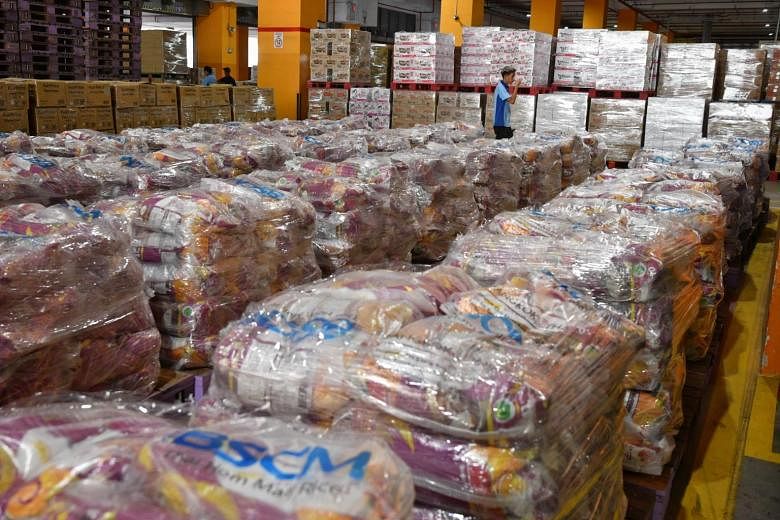SINGAPORE - There is no risk of Singapore running short of essential food items today even as it relies heavily on imports, but food security cannot be taken for granted, Environment and Water Resources Minister Masagos Zulkifli said on Monday (Feb 10).
Climate change is one factor that will seriously challenge the nation's food supply strategy, he said, citing how erratic weather, changes in crop growth patterns and water shortages are putting pressure on food supply around the world.
Natural and man-made disasters as well as population growth could also affect the availability of supplies, he added.
"This is why Singapore cannot take food security for granted, nor can we rely on the same old game plan," he said.
Mr Masagos was speaking at the launch of the Singapore Food Story - which outlines Singapore's strategies in ensuring its food security - at Gardenhouse at Jurong Lake Gardens.
The Republic has proven resilient in the past to short-term supply disruptions because of astute planning and the connectivity of the transport network, he said.
"That is why, when some Singaporeans started buying up food last Friday, and photos of empty supermarket shelves were circulated, we were able to say with full confidence that there is enough food for everyone," added Mr Masagos. He was referring to the news of Singaporeans' panic buying of instant noodles, toilet paper and other household items after the country raised its response level to the coronavirus outbreak, which started in China in December.
Last year, Singapore emerged tops for the second year running in the Economist Intelligence Unit's Global Food Security Index, which assessed if people have access to affordable, quality food to meet their nutritional needs.
When climate-related and natural resource risk factors were taken into account, however, Singapore fell to 12th place on the index.
This is partly due to the fact that Singapore imports more than 90 per cent of its food supply, making it susceptible to global food supply shocks arising from natural calamities.
Mr Masagos pointed out that apart from diversifying Singapore's food import sources, growing more food locally is also critical in ensuring the nation's food security, drawing a parallel with Newater as an important factor in Singapore's pursuit of a resilient water supply.
Singapore's "30 by 30" goal - to grow enough local food to meet 30 per cent of its nutritional needs by 2030 - using less than 1 per cent of its land area will be the most ambitious leg to build, he added.
But if successful, the technologies and unique processes developed in the pursuit of this goal will be an added value that local companies can offer to growing food overseas.
To help local farms be more resilient towards changes in climate, about $38 million from the Agriculture Productivity Fund has been pumped into more than 100 farms here to develop automated and climate control functions, doubling average productivity levels to about 200 tonnes per hectare per year for vegetable farmers in Singapore.
In land-scarce Singapore, farms have also ventured into high-rise production, said Mr Masagos, citing as an example local company Apollo's new eight-tier fish farm in Lim Chu Kang which is being built.
He added that farms should also leverage science, technology and innovation and that food production is a promising area in which local researchers and start-ups can provide new opportunities and jobs for Singaporeans.
Last year, the National Research Foundation committed $144 million to fund agri-food research under the Singapore Food Story Research and Development Programme. The first grant call for proposals for sustainable urban food production and alternative proteins went out in December last year.
Mr Masagos noted that Singaporeans, as consumers, can do their part by supporting local produce.
He said: "Local produce is grown close to home, and it's actually at home. It is therefore safer, fresher and lasts longer.
"There is less spoilage and food waste, as the produce does not need to travel for long periods of time before reaching the consumer."
The Singapore Food Agency has also developed a new local produce label to replace the old one to help consumers identify local produce more easily.
The new label can be seen on local produce on supermarket shelves starting from August.
The Singapore Agro-Food Enterprises Federation has also partnered Redmart on Lazada to launch an e-SG Farmers' Market with 17 farmers so far, to help them increase their distribution channels and reach more consumers.
Said Mr Masagos: "Food security is an existential challenge for Singapore. But it also offers many exciting opportunities for Singapore and we can create many good and green jobs for Singaporeans.
"Just like what we have done for water, we can overcome our food challenge by planning and investing for the long term, and working together as a nation. Just like water, the technology we use for food security will also enable our companies to grow overseas with our unique value proposition."












